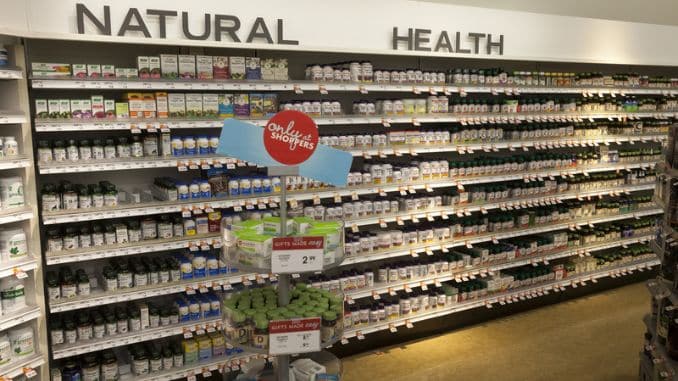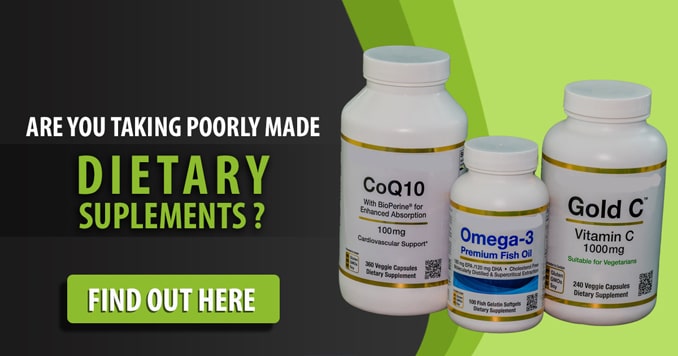
It is 4 am, and I am at the Seattle Airport. I am on my way to San Diego for mastermind meetings with numerous other people in alternative health. Sean Croxton of Underground Wellness organizes the meetings. I got a great interview for you today. More on that later, but today, it is an interview with Sol Orwell about Good, Bad, and Ugly About Supplements. [¹]
Yesterday, Sol gave us an article on Vitamin K.
If you enjoyed that, you would enjoy this interview.
~ Rick
Pros and Cons of Supplements
Today I have another interview for you, and we will chat about supplements.
We will highlight the pros and cons when it comes to supplements, and we will highlight a couple of supplements and probably challenge a couple of beliefs and thoughts you have when it comes to supplements and probably some of the supplements that you are taking right now. The Good, the Bad, and the Ugly About Supplements.
Rick Kaselj: I will get Sol to introduce himself.
Sol Orwell: Hi, I am Sol from Examine.com.
My pathway into this is a little bit different than most people’s. I retired about 5 to 8 years ago.
Of late, I have traveled around and was in Argentina for a while. Let me tell you when you can order online ice cream delivery and get a liter of ice cream within 10 minutes. It’s hard not to stay in shape or not to get fat.
Then I moved to Manhattan after that, living right above a bakery. When you wake up and smell cookies in your apartment, it’s hard not to go and get some.
By the time I returned to Toronto, I was pretty much out of shape. As I got into shape, in my very analytical mind, I started looking at what was working and what wasn’t working. I was very frustrated that there was no reference site on supplementation and nutrition.
This is what got me started in this industry. We have been at it for two and a half years now. We have over 20,000 references for supplements and nutrition. And basically, we are just building a reference site for what works and what doesn’t. The good, the bad, and the ugly about supplements.
Rick Kaselj: Awesome.
Sol Orsell: That’s the gist of it!
Mistakes in Buying Supplements
Rick Kaselj: Cool. Jumping into the questions when it relates to supplements, what are some mistakes people make when it comes to buying supplements?
I know how it is; people will watch TV, read a magazine, or talk to a friend, and their friend will say, “Hey, you should take this supplement” for whatever, and go to the grocery store and buy something.
What mistakes are people making when it relates to buying supplements? The good, the bad, and the ugly about supplements.
Sol Orsell: To be honest, I think it is a part of human nature where you hear about some supplement or pill, take it, and you’ll be much better.
The reality is that most of them are all marketing, and every time you hear exotic supplements, I am sure you hear from the media that some supplements will help you lose your fat and all that stuff. The good, the bad, and the ugly about supplements is that you have to be skeptical about these kinds of claims.
You can make a legitimate claim, but it still doesn’t work.
My favorite example is Glutamine. Glutamine is a muscle builder and builds muscle, but can you link it to actual muscle cell change? Glutamine is amazing for intestinal health but doesn’t help growing muscles. When you ingest Glutamine, your intestines love it and sequester it from your cells.
When you buy supplements, unless you know specifically what you are looking for, it’s really easy to get into the exotic names and claims. Honestly, if it “sounds too good to be true” likely is the old analogy, then you should apply that in the same reasoning regarding supplements.
1. Supplements Quality

Rick Kaselj: Okay. Is there a difference when it relates to the quality of supplements? If you go to the grocery store and you’re wandering through the pharmacy and are looking at supplements, Is there a difference when it comes to the quality — you’ve got a super expensive one, one that is medium range, one that has no name brand?
Sol Orsell: Quality is kind of a hard one to dictate.
The manufacturing processes are in China and come from the same places.
The general truth is some more expensive ones, which mean better quality, tend to exist in all markets. We can apply the same to supplementation. But the reality is that companies know this too.
They know that you are looking for something more expensive, so they increase their prices a little bit, and you come across their impressive designs and think they are high quality. The simplest way to know if it’s a legitimate brand is for the FDA to issue citations to supplementation companies.
The good, the bad, and the ugly about supplements includes understanding that the FDA is regularly bashed for not doing enough to watch over supplements, but the reality is there’s a congressional bill passed that lets supplements make these claims. What the FDA does is look for the quality of the product.
If you are looking at some brand, you can look at Consumerlab.com, a good website for you to look up; they do their testing. But if you go to Google and search for FDA plus the company name. This will display recall citation problems.
Rick Kaselj: That’s awesome. The FDA thing is very interesting; I didn’t know that.
Sol Orwell: It’s a little bit underrated?
Rick Kaselj: Yeah, that’s cool.
2. Supplements Purity
If we are shopping in a grocery store and looking for some supplements, and one is more expensive than the other, does it reflect being of better quality?
Sol Orwell: Yes, it reflects quality, but it can also reflect purity.
An example is Fish Oil. [²] Some pills may say it has 1000 mg of Fish Oil, and you think, “oh, that sounds pretty legitimate.” But you look at the label, and the only part of fish oil that matters is the EPA and DHA. If those two combine for only 300 mg, you get 70% of it.
Quality and prices may reflect how pure the product is. A supplement can have 1000 IU vitamin D versus 5000 IU vitamin D in another. You should look at the label and see how much of the active ingredient is in there.
Fish Oil is the easy one that I could say because you look at Centrum and all those brands, and you say, “oh, it’s so cheap for so much fish oil,” but you look at the purity, and it’s pretty much garbage.
I hate to pick on Centrum, but it is a popular supplement. If you look at other fish oil brands with higher levels, you will see that fish oil is pretty easy to find because of the processing. Pretty much all of the contaminants are gone anyway. But you look at the actual label, and it will show you the EPA and DHA. You can glean from that the purity is a reflection of the quality of the product too.
Rick Kaselj: Awesome.
3. Overrated Supplements
What are some supplements out there that are overrated, pumped up, and don’t have that much effect on the body?
Sol Orwell: Honestly, you could almost say almost all athletic supplements are quite overrated.
The obvious ones would be Glutamine. We have this study that shows it’s amazing for muscle synthesis. But the moment that you start to digest it, the actual healing processes get in the way.
Another overrated one would be Trib. You feel like your testosterone is up, and you feel like your libido is higher. This testosterone booster often increases your libido, but there’s no testosterone booster associated with it. The biological process is going on inside you, not the drugs.
Those two would be the primary ones.
The third one we like to pick is Glucosamine; it is one of those where 10% say it works amazing and 90% say it’s useless. Even then, glucosamine hydrochloride doesn’t have any evidence that it works; only Glucosamine sulfate has any evidence. What’s happening is that you are deficient in sulfate. And you are getting that excess sulfate due to Glucosamine which is potentially healthy.
MSM and Chondroitin, the other two popular joint pain relievers, have sulfate. Or any of these others work. It’s possible again; it’s more of a reflection of a bad diet than Glucosamine.
Same thing with the testosterone booster. If you go back for a second, you will fall below your baseline if you are deficient in stuff like zinc or magnesium. The thing is, you start with boosters that have zinc and things start to improve. But it’s more a reflection of a poor diet. And they are just taking you back to baseline; then they are doing anything that boosts you up.
That is the end of part 1. I will have part 2 out soon of Sol’s Supplement Goals Reference Guide
Rick Kaselj, M.S.
Discover the truth about supplements with Sol Orwell. Empower your health journey: Get our Guide to Dietary Supplements.




